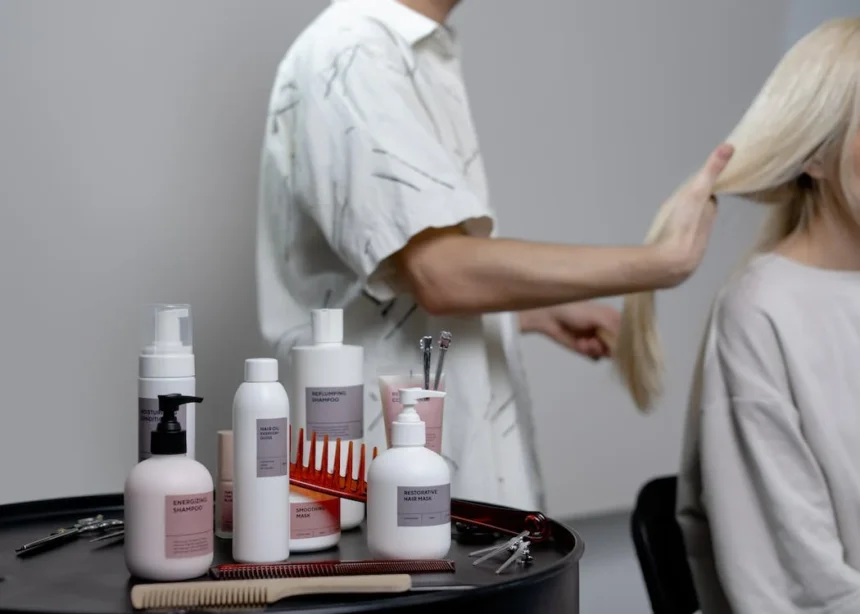Chemically straightening or relaxing your hair has been a popular hairstyling method for decades.
However, recent lawsuits claim that chemical hair straighteners may expose users to harmful ingredients like formaldehyde that can increase cancer risk. Major brands like L’Oréal, Dark & Lovely, African Pride, Revlon, and Motions face lawsuits over their hair straightening products.
If you’re using chemical hair straighteners, you should be aware of the allegations and lawsuit details. This guide covers five key things consumers need to know.
#1. Understanding the Lawsuit
The lawsuits emerged in 2022 when a study published in the Journal of the National Cancer Institute examined the potential health risks of using several chemical hair straightening products.
The study compared cancer diagnosis rates between regular hair relaxer users and non-users in 33,497 women aged 35 to 74. They found out that the women who used chemical hair relaxers were twice at risk of being diagnosed with uterine cancer. Since then, there has been a flurry of lawsuits against chemical hair straightener manufacturers over cancer risks.
The hair straightener lawsuit claims that repeated, long-term use of certain straightening products has caused health issues like breast cancer, uterine cancer, and leukemia in women due to exposure to harmful ingredients. The ingredients most concerning in these lawsuits are formaldehyde, phthalates, and parabens.
Though these chemicals can be found in many cosmetics, the lawsuits argue hair straightener companies specifically failed to warn about cancer risks from prolonged use and falsely marketed their products as safe. Plaintiffs are seeking financial compensation from the companies for medical costs and damages.
While costly settlements could take time to resolve, the lawsuits spotlight the need for transparency about chemical exposures in personal care items.
#2. The Concerning Chemicals
The lawsuits focus on specific chemicals frequently found in hair straighteners:
Formaldehyde: A known human carcinogen that can cause leukemia and other cancers. Often released from chemical reactions with other ingredients. Even ‘formaldehyde-free’ labeled products release formaldehyde as a byproduct after interacting with heat or water.
Phthalates: Also known as plasticizers, they are added to fragrances and plastics to increase their durability. Phthalates are synthetic chemicals that act like endocrine–disruptors and interfere with the natural hormone cycle. These chemicals are also connected to breast cancer, early puberty, decreased testosterone, and birth defects.
Avoid products with diethyl phthalate (DEP), dibutyl phthalate (DBP), dimethyl phthalate (DMP), and diisobutyl phthalate (DiBP).
Parabens: These chemicals have been long used as preservatives in personal care products. They increase the product’s shelf-life and also act as antibacterial agents. They are classified as xenoestrogens, meaning, they increase the estrogen levels in the human body. Parabens are associated with breast cancer risk. They can also affect fertility levels, allergies, cholesterol, blood sugar, thyroid, and immune function.
Avoid products with Methylparaben (methanol), Ethylparaben (ethanol), Isopropylparaben (isopropanol), Propylparaben (n-propanol), and Butylparaben (butanol).
While some amount of exposure is difficult to avoid, repeated use of products containing these chemicals substantially increases exposure.
#3. Current Status Of The Lawsuit
The Hair Straightener Lawsuit is far from a static picture; it’s a dynamic legal journey currently in its early stages.
As of January 2024, over 8,000 individual cases have been consolidated into multidistrict litigation (MDL) in Illinois, streamlining the proceedings and paving the way for efficient progress. This consolidation marks a significant milestone, indicating the seriousness and momentum of the collective claims. In December 2023, U.S. District Judge Mary Rowland approved the majority of claims in the hair relaxer lawsuit against L’Oréal and Revlon. The plaintiffs allege that the defendants’ products were poorly designed, which resulted in critical health problems like uterine and ovarian cancer.
Overall, the outcomes and settlements could take several months or even years to come about. Consumers interested in joining any class action lawsuits should follow media coverage and check government dockets for new case filings and updates.
#4. Understanding Your Eligibility
If you developed cancer after long-term use of the hair straighteners named in the lawsuits, you may be eligible to participate. Lawyers are actively seeking people who meet the following criteria:
- Diagnosed with breast, uterine, ovarian, or other cancers linked to chemical exposure
- Have proof of using the defendant’s products for 1+ years
- Have medical records and evidence to demonstrate the cancer diagnosis
- Are within the statute of limitations (time limit to file lawsuits)
Even if you don’t have cancer, you may still qualify for medical monitoring relief. It will cover the costs for testing and doctor visits if you were once an extensive user.
Consult a product liability attorney to understand if your case meets the eligibility factors. Providing evidence like receipts and records of use can help. The more people join, the more settlement pressure on manufacturers.
#5. Settlement Options
While no settlements have been made, it is essential to understand the range of potential settlements so you can navigate the situation with clarity.
TorHoerman Law expects the settlement amount per person to be around $100,000 to $1,500,000. These estimations are based on previous similar lawsuit settlements and are not guaranteed by any means. Your settlement might even include lump sum payments, medical monitoring costs, treatment funds, and monthly payouts if you’ve or will experience a loss of wages.
Not just money, settlements can also spur manufacturers to remove certain chemicals from products and invest in safer alternatives. For consumers, the goal is accountability, transparency, and access to healthy products going forward. Settlement talks will determine actual compensation.
Summing up, the chemical hair straightener lawsuit highlights critical health issues and the need for accountability from personal care companies.
As consumers, we deserve transparency and products free from unnecessary risks. While outcomes may take time, consumers now have a greater awareness of potential chemical risks. Staying informed, checking product labels, consulting doctors with any concerns, advocating for safer alternatives, and supporting legal efforts can pave the way for a future where beauty isn’t compromised by health.
Remember, your well-being comes first. Stay vigilant yet hopeful these cases will spur positive change for all.






